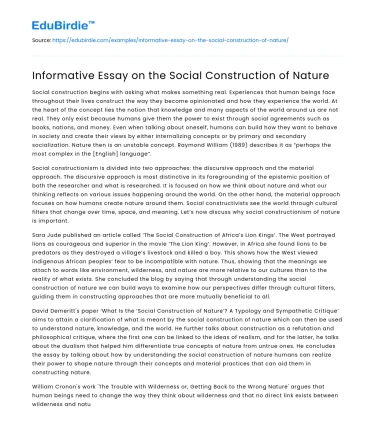Social construction begins with asking what makes something real. Experiences that human beings face throughout their lives construct the way they become opinionated and how they experience the world. At the heart of the concept lies the notion that knowledge and many aspects of the world around us are not real. They only exist because humans give them the power to exist through social agreements such as books, nations, and money. Even when talking about oneself, humans can build how they want to behave in society and create their views by either internalizing concepts or by primary and secondary socialization. Nature then is an unstable concept. Raymond William (1989) describes it as “perhaps the most complex in the [English] language”.
Social constructionism is divided into two approaches: the discursive approach and the material approach. The discursive approach is most distinctive in its foregrounding of the epistemic position of both the researcher and what is researched. It is focused on how we think about nature and what our thinking reflects on various issues happening around the world. On the other hand, the material approach focuses on how humans create nature around them. Social constructivists see the world through cultural filters that change over time, space, and meaning. Let’s now discuss why social constructionism of nature is important.
Save your time!
We can take care of your essay
- Proper editing and formatting
- Free revision, title page, and bibliography
- Flexible prices and money-back guarantee
Sara Jude published an article called ‘The Social Construction of Africa’s Lion Kings’. The West portrayed lions as courageous and superior in the movie ‘The Lion King’. However, in Africa she found lions to be predators as they destroyed a village’s livestock and killed a boy. This shows how the West viewed indigenous African peoples’ fear to be incompatible with nature. Thus, showing that the meanings we attach to words like environment, wilderness, and nature are more relative to our cultures than to the reality of what exists. She concluded the blog by saying that through understanding the social construction of nature we can build ways to examine how our perspectives differ through cultural filters, guiding them in constructing approaches that are more mutually beneficial to all.
David Demeritt's paper ‘What Is the ‘Social Construction of Nature’? A Typology and Sympathetic Critique’ aims to attain a clarification of what is meant by the social construction of nature which can then be used to understand nature, knowledge, and the world. He further talks about construction as a refutation and philosophical critique, where the first one can be linked to the ideas of realism, and for the latter, he talks about the dualism that helped him differentiate true concepts of nature from untrue ones. He concludes the essay by talking about how by understanding the social construction of nature humans can realize their power to shape nature through their concepts and material practices that can aid them in constructing nature.
William Cronon's work 'The Trouble with Wilderness or, Getting Back to the Wrong Nature' argues that human beings need to change the way they think about wilderness and that no direct link exists between wilderness and nature. He claims that “if we allow ourselves to believe that nature be wild then our very presence in nature represents its fall”. He illustrated a new urban cultural invention where he does not want wilderness to be the landscape that has been preserved artificially to show unity with nature. When talking about Western culture, he pleads with readers to recognize the surroundings they live in as natural and believes that only when we stop thinking of wilderness as “a dualistic vision in which the human is entirely outside the natural”, we will find solutions to our environmental problems.
Debates over the social construction of nature have been going on for a long time and will continue for years to come. The discussion has tried to show an understanding of how different aspects of nature such as cultural filters, power to change, and separating from nature influence human thinking and aid in the construction of nature.






 Stuck on your essay?
Stuck on your essay?

